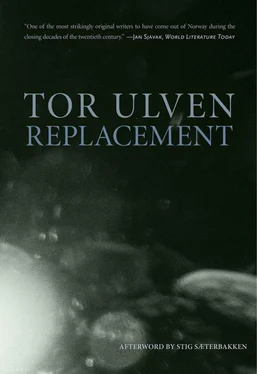And then, what seems to be a story within the story: the intense fantasies and/or memories, it’s unclear which, about an unhappy, that is to say, an unfulfilled saga of love. Every now and then, the protagonist’s thoughts return to a woman he was once in love with (as a young man) and perhaps even lived with (as an adult), until she finally disappeared (committed suicide, most likely). Or are there two women? Perhaps it’s the other (the same?) woman, whom he (the same man?) met with in secret, a secret rendezvous characterized by a halfhearted attempt to reach out to one other, both of them struggling to connect, like two badly tuned radios, and to cool his blood, his mistress, if that’s what she is, cruelly asks, or even worse, asks because she perceives that his blood doesn’t need cooling, what he thinks his wife would say if she could see them like this.
Or is “she” merely a substitute for she , the italicized one, the one, that is, who got away, the one he couldn’t have, or else perhaps the italicized, the idolized her whom he couldn’t have, because she doesn’t exist, because she’s nothing more than the notion of what she might’ve been, if she’d really existed. He thinks about the things he could’ve said to her , which he can’t say to her, because “she” occupies the thankless role of the real woman, doomed to always lose out to the dream women.
Every now and then, however, a trace of tenderness rears its head in these moments, for example, in the painful scenes of the first stages of love, before the heart’s desires are realized, before dreams become reality; indeed, before one can even say they know the person whom they, for reasons yet unknown, are dying to be with, lose themselves in, become one with; painful, because one can’t avoid the foreknowledge of where it will all lead: “like when you’re standing outside a large amusement park in silence (and you can hear nothing but the distant sound of an orchestra tuning their instruments from somewhere beyond the trees), and you close your eyes and sigh in expectation, standing there before the main gate, where lightbulbs gleam brightly against the dark, before you go inside, where the few attractions will just become noisier and noisier, more and more vulgar, as the jostling crowd grows ever larger, the hawkers bolder, the entertainment simpler, the colors gaudier, the make-up shoddier,” and so forth.
Wreakage of a different kind, a different and thinner-skinned sensitivity, in the river of ruminations and memories. Whoever they are, however, these longed-for women also include the one the protagonist (or a protagonist) seemingly lives with, or at the very least who helps him, who takes care of the necessities, deals with practical matters, as they say, and who only produces irritation, if not to say disgust, if not to say hatred in him, emotions that presuppose a long mutual existence that’s spurred them to such heights (or depths). Or perhaps we’re just talking about the maid? At the same time, she’s an absent presence, she’s never there, it’s like she doesn’t exist, like she’s just made up of all the traces she leaves behind, the things she tidies up and purchases, the small changes she makes to the environment, like a chair that’s out of place, something that, once again, only serves to strengthen and deepen the helpless old man’s feelings of irritation, of disgust, of hatred.
That is, of course, if the entire novel isn’t simply a series of imaginary events, vague possibilities, an endless procession of could-have-beens, both poignant and angst-ridden, a series of possible milestones in the fictional unfolding of an unlived life placed under a microscope — or under operating-theater lights, ready for dissection — or under the dim glow of a ceiling lamp that’s flecked with the shadows of all the dead flies that have met their end there.
And yet, another woman — but is it her ? or simply her? or neither of them? a third? — whom he, forty years after they met for the last time, considers contacting when he finds out that her husband has died. In this way, one person’s death flows into another person’s life and vice versa, all is connected, or: all is replaced, like threads on a loom, threads that, taken together, offer a certain view of life, of existence’s awesome underpinnings, its blind forward thrust, its unbroken flow, its ruthless, mechanical continuity. The boundary separating consciousnesses disappears. People leave the individual behind and enter a collection of damned souls, caught up in the rushing flood of thought. This is precisely what transforms Replacement into a great poetic work within the framework of a short novel. It’s the overwhelmingly large in the almost humbly small drama of existence personified by a hungover old man who, at this very moment, is rummaging through a chaos of expired groceries in search of a cold beer.
*
What else is there to say?
That Ulven, like every other self-respecting author, was an avid reader of Donald Duck.
That, ditto, he loved sad songs.
And that these extremes, which aren’t extremes at all, but are really one and the same thing, when you come right down to it — namely, a weakness for slapstick comedy and a streak of the melancholy — might give a pretty good picture of what Ulven stood for.
And I think that every great body of work has an aura, which can be difficult to pin down at times, but which nonetheless surrounds the body of their texts, a sum, perhaps, of their individual components, a sum of the writer’s distinct linguistic approach, a gleam of what might be called authority or originality, their unmistakable way of writing, which sooner or later transforms their last name into an adjective, so that one can ultimately talk about the Beckettian, the Célinean , the Bernhardesque, etc.
And I think that the greatest honor an author can achieve is to reach adjectival status.
And I think that the Ulvenesque has an aura that will shine for decades, no, for centuries to come.
STIG SÆTERBAKKEN, 2012
ABOUT THE AUTHOR AND THE TRANSLATOR
Widely considered one of the greatest postwar poets in Norway, TOR ULVEN (born in 1953) was also one of its greatest innovators in prose, influencing countless other fiction writers, not least Jon Fosse and Stig Sæterbakken. Ulven committed suicide in 1995.
KERRI A. PIERCEtranslates from German, Danish, Dutch, Portuguese, Spanish, Norwegian, and Swedish. She is the translator of Lars Svendsen’s A Philosophy of Evil , Mela Hartwig’s Am I a Redundant Human Being? , and other works available from Dalkey Archive Press.
NORWEGIAN LITERATURE SERIES
The Norwegian Literature Series was initiated by the Royal Norwegian Consulate Generals of New York and San Francisco, and the Royal Norwegian Embassy in Washington, D.C., together with NORLA (Norwegian Literature Abroad). Evolving from the relationship begun in 2006 with the publication of Jon Fosse’s Melancholy , and continued with Stig Sæterbakken’s Siamese in 2010, this multi-year collaboration with Dalkey Archive Press will enable the publication of major works of Norwegian literature in English translation.
Drawing upon Norway’s rich literary tradition, which includes such influential figures as Knut Hamsun and Henrik Ibsen, the Norwegian Literature Series will feature major works from the late modernist period to the present day, from revered figures like Tor Ulven to first novelists like Kjersti A. Skomsvold.
1 Schopenhauer, The World as Will and Representation, Vol. 1 , trans. E. F. J. Payne (New York: Mineola, Dover, 1966) 185–86.












